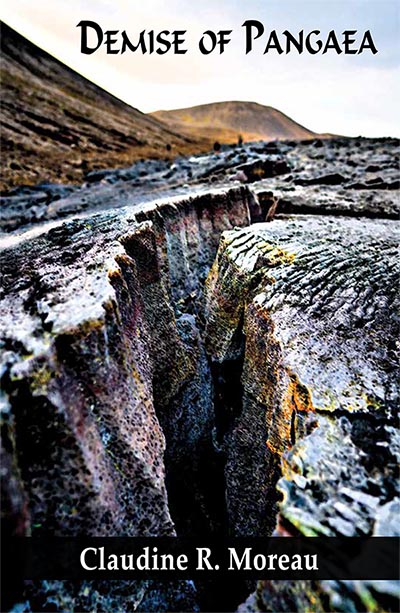Demise of Pangaea
poems by
Claudine R. Moreau
ISBN: 978-1-59948-990-2, 70 pages, $14 (+ shipping)
Release/Ship Date: April 23, 2024
The Advance Sale Discount for this title has expired. For those who prefer to pay by check, the price is $18/book (which includes shipping & sales tax) and should be sent to: Main Street Rag, 4416 Shea Lane, Charlotte, NC 28227. For wholesale orders, please contact: editormsr@outlook.com
PLEASE NOTE: Ordering in advance of the release date entitles the buyer to a discount. It does not mean the book will ship before the date posted above and the price only applies to copies ordered through the Main Street Rag Online Bookstore.
 Claudine R. Moreau was born near Michigan’s Saginaw Bay, but was raised in the bituminous coal mining country of southwestern Pennsylvania. She is the author of the chapbook Dark Machines (Fugitive Poets Press 2012). Now residing in North Carolina, Moreau teaches physics and astronomy at Elon University and also serves as a faculty director of a first-year student neighborhood. In the not so far future, she hopes to retire on a mountaintop where the sky is dark enough to see the Milky Way.
Claudine R. Moreau was born near Michigan’s Saginaw Bay, but was raised in the bituminous coal mining country of southwestern Pennsylvania. She is the author of the chapbook Dark Machines (Fugitive Poets Press 2012). Now residing in North Carolina, Moreau teaches physics and astronomy at Elon University and also serves as a faculty director of a first-year student neighborhood. In the not so far future, she hopes to retire on a mountaintop where the sky is dark enough to see the Milky Way.
Nabokov wrote that writers should have the precision of poets and the imagination of scientists. In astronomer/poet Claudine Moreau’s insightful and moving collection, Demise of Pangaea (our ur-continent), science is sexy, poetry precise. She uses a language of the heavens uncommon in starry-eyed poets, grounded in the bituminous folds of the Earth and the swirling waltz of galaxies. There is generosity here, the personal and universal finding common cause in revealing truths about ourselves. ~John Yewell is a co-founder of Writeaways writing retreats and workshops
In this collection, the fragile humans are like continents pulled apart by the gravity of their appetites and circumstances. Claudine Moreau negotiates her orbit around and through her life’s collisions and mergers with a mixture of wonder and hard-won truth in rhythmic sentences that oscillate as they sing us forward. Her lines reverberate with scientific themes that ebb and flow like the tides, folding their edges into the reader’s taut subconscious, foaming with quiet surprises over and over. ~Keith Flynn, author of The Skin of Meaning and editor of The Asheville Poetry Review
Demise of Pangaea invites us to the realm where vulnerability and curiosity converge, where the penumbra between tenderness and isolation gives off a radiant light. Scanning from the expanse of space to the confines of coal mines to the crevices of a body, Claudine R. Moreau uses scientific precision to transcend the boundaries of conventional perception. These exquisite poems thrum with the music of the spheres, the symphony of atoms, the song of the heart. ~Ross White, author of Charm Offensive
Claudine R. Moreau’s Demise of Pangaea is a wonderful collection of poems about men and women, about sex and science and motherhood, about the past and the future, all told with a scientist’s eye and a poet’s love of language. Trust me, once you start Demise of Pangaea you won’t put it down. These poems are honest and true and this is a collection I wanted to reread as soon as I finished. ~Steve Cushman, author of How Birds Fly and The Last Time
Sending Men to Venus
The men in machines come.
Solar arrays slice the dark.
Circuitry, asleep for months,
awakens upon approach.
They chirp like birds, dive
into my arms, an orbital nest.
Each one–so full of hope!
In descent with a secret flaw–
string-tangled parachute,
cracked heat shield,
erroneous code, short circuits.
Such bad engineering
at my doorstep.
Some survive the landing,
plummet in on skyhooks,
rove my volcanic terra,
scan for oxygen,
map magnetism of skin,
take gravity’s pulse.
They don’t last long–
the heat and pressure.
But more still voyage.
I see the next tiny light
edge closer, it accelerates.
Stag at the 25th High School Reunion in Coal Country
Everyone except me
is prying open a clamshell
wallet. Showing off
Olan Mills portraits–
daughters in pink ballet shoes,
neon tutus, thick dots of rouge.
Sons in Polamalu jerseys,
baseball caps, and cleats.
Whole families huddled
in matching sweaters.
The photographer corrals
us for the photo.
One of my classmates,
now a coal miner, slings
an arm full of muscle
over my shoulder.
I never wanted a man
like him–who shovels coal
onto the belt with dust
piling like slag heaps
in lungs, who sweats inside
Earth’s narrow bone shafts.
Yet, when he leads me to meet
his wife and kids, I follow
to a gingham-checked picnic table
in the shade of a black birch.
Summer air is greased
with the scent of cooking meat,
fat bleeds over hot coals.
Now, I see how she could love him–
for his massive soot-cured hands,
muscular density, imperfect
geometries of teeth,
his volume, the sheer
weight that grounds him.
Extinction of the Milky Way
Slow murder of light–
Hera’s spurting milk,
silvery sky-creek,
trail of horseshoe spark.
In the city, it is mythical
like a centaur, Atlantis,
or the fountain of youth.
Soon, on the farmland
and desert mesa,
the milky stream
will be blotted out.
The galaxy’s remains,
spiral-armed bones,
descend into the fossil record.
It begins. The first
generation is born
whose eyes cannot see
Galileo’s dusty embers.
The constellations will be next.
Imagine one night, Orion’s belt slips–
buckle and sword. Listen!
Hear the heavy clunk as it hits.
The Man Who Loved Boobs
He took notes at the grocery store–
how nipples surface
in the freezer aisle.
On the subway, he estimated cup sizes,
memorized the parabolic curves
they carved out in space.
He mapped the topography of each pair.
His sketchbooks revealed a cartographer’s
love of alpine peaks, gullies,
slow rolling hills.
He taught me how an artist
sees color in skin–
arcs of green and cerulean blue
in the tender sags of stretch marks,
dioxazine purple and zinc white
that ring the areola,
fields of cadmium orange
flanked with dots of hansa yellow
near the arm’s hollow,
burnt umber shadow at the curved
cusp of breast.
Later it came, that sickness,
tore at my left breast.
Turpentine lifted layer upon layer,
touch after touch removed
until even his first set of kisses
on each asymmetrical nipple, erased.
He loved me for my radioactive
hair that pulled out in his hands,
my tubes and my pus, the quiet rip
of hospital tape pulling up skin.
He dragged his finger across,
my dissected plateau–
quinacridone rose, ochre, titanium white,
he said. We laughed hard
for no reason. Fear dissolved,
a toxic solvent evaporating
in a well-ventilated room.


 Claudine R. Moreau was born near Michigan’s Saginaw Bay, but was raised in the bituminous coal mining country of southwestern Pennsylvania. She is the author of the chapbook Dark Machines (Fugitive Poets Press 2012). Now residing in North Carolina, Moreau teaches physics and astronomy at Elon University and also serves as a faculty director of a first-year student neighborhood. In the not so far future, she hopes to retire on a mountaintop where the sky is dark enough to see the Milky Way.
Claudine R. Moreau was born near Michigan’s Saginaw Bay, but was raised in the bituminous coal mining country of southwestern Pennsylvania. She is the author of the chapbook Dark Machines (Fugitive Poets Press 2012). Now residing in North Carolina, Moreau teaches physics and astronomy at Elon University and also serves as a faculty director of a first-year student neighborhood. In the not so far future, she hopes to retire on a mountaintop where the sky is dark enough to see the Milky Way.